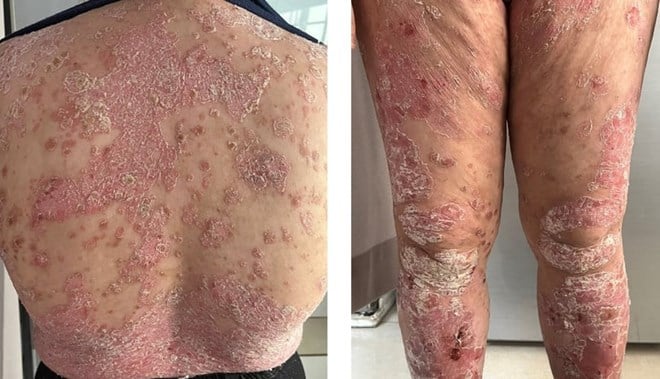
The Central Dermatology Hospital admitted a 31-year-old female patient from Hung Yen . The patient had the first signs of psoriasis appearing more than 10 years ago with a few red patches with few scales on her hands when she was a university student.
At that time, the patient did not know and did not think he had psoriasis. He bought medicine to apply and found it helped. Occasionally, it came back but he thought it was just a simple allergic skin reaction.
In 2015, after graduating from university, the female patient followed her husband to Vung Tau to work and live. However, after getting married for a while, the lesions appeared more and spread more. At that time, the patient went to the doctor and was diagnosed with psoriasis.
Because it is a chronic disease, treatment is for long-term control, not a complete cure. Her husband and his family blamed her for hiding her illness and deliberately deceiving them. Family life became more difficult, and conflicts became more and more intense. Her husband constantly criticized her, and her husband's family did not sympathize, so she became quiet and decided to return to Hanoi and register for another course of study. She did not dare to share the matter with her family, only using the excuse of going to school to return to Hanoi.
The patient's symptoms of depression gradually became more obvious and were known to family members when they visited. The patient preferred to lie alone, was afraid of communication, was afraid of light, and afraid of noise. Because of this psychological condition, the patient was afraid to go to the doctor and did not comply with treatment, so the psoriasis became more and more severe.
Doctor Nguyen Thi Tuyen, Department of Skin Disease Treatment for Women and Children (Central Dermatology Hospital) said that the patient's psychological problems were getting worse. Although her family took her to see a doctor and treated her psychological condition, it did not improve. The patient was admitted to the hospital with widespread psoriasis lesions almost all over her body, her eyes looked lifeless and absent-minded.
In addition to treating psoriasis, doctors sent the patient to a mental health specialist and diagnosed him with schizophrenia – a severe and difficult to control condition.
Psoriasis is a benign, fairly common, non-contagious but chronic disease. However, its impact on patients is often more severe than other chronic diseases because the lesions are present on the skin. This causes severe psychological effects. This impact is not only due to the lesions of the disease but also due to the stigma and lack of understanding of those around them. Therefore, people with psoriasis are susceptible to problems such as shame, lack of confidence, reduced self-esteem, low self-worth, sometimes social isolation, discrimination, reduced opportunities in work, social interaction, difficulties in daily life... even many severe cases can cause depression problems, suicidal thoughts.
Furthermore, these psychological problems in turn aggravate psoriasis, making it harder to control, creating a vicious cycle that makes the patient increasingly depressed.
Source: https://laodong.vn/suc-khoe/co-gai-tre-roi-vao-tram-cam-tam-than-phan-liet-vi-mac-benh-vay-nen-1361211.ldo





![[Photo] Anh Hoang - Dinh Duc successfully defended the men's doubles championship of the National Table Tennis Championship of Nhan Dan Newspaper](https://vphoto.vietnam.vn/thumb/1200x675/vietnam/resource/IMAGE/2025/5/23/d6ab3bcac02c49928b38c729d795cac6)

![[Photo] Top players gather at the 2025 Nhan Dan Newspaper National Table Tennis Championship](https://vphoto.vietnam.vn/thumb/1200x675/vietnam/resource/IMAGE/2025/5/23/9ad5f6f4faf146b08335e5c446edb107)



















































































Comment (0)